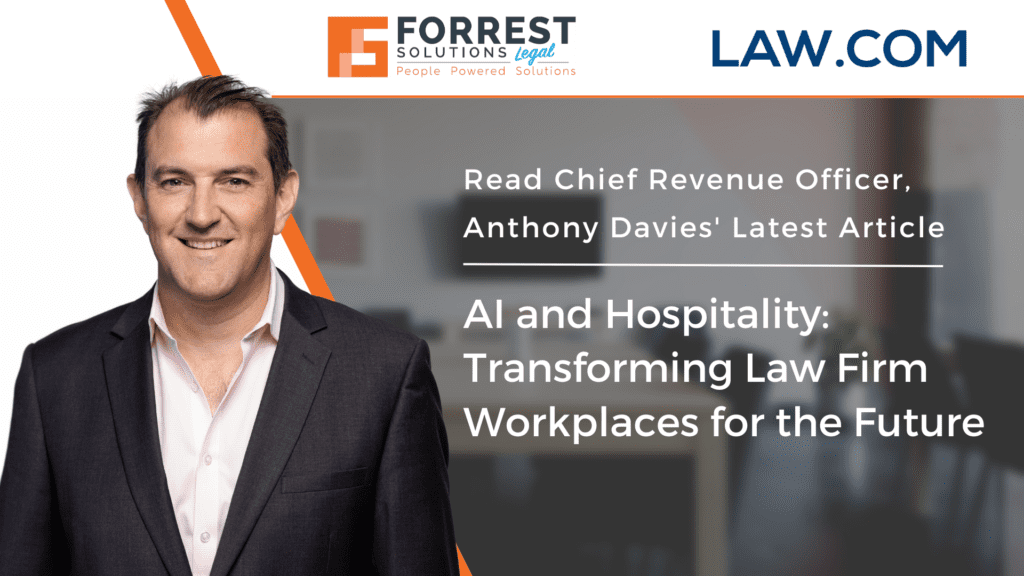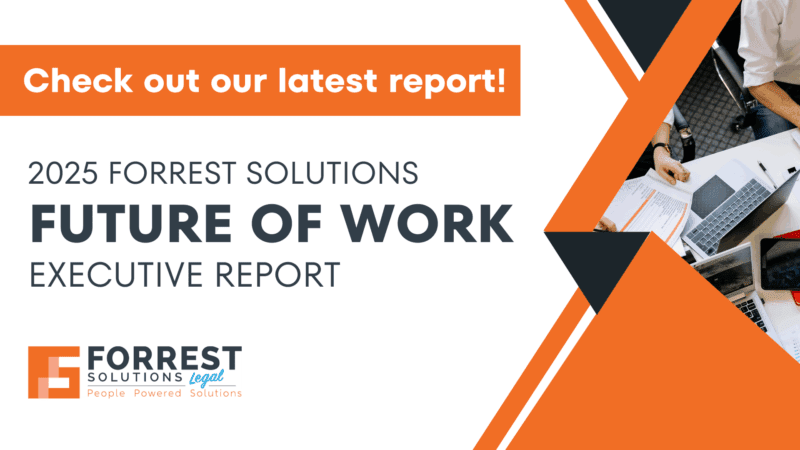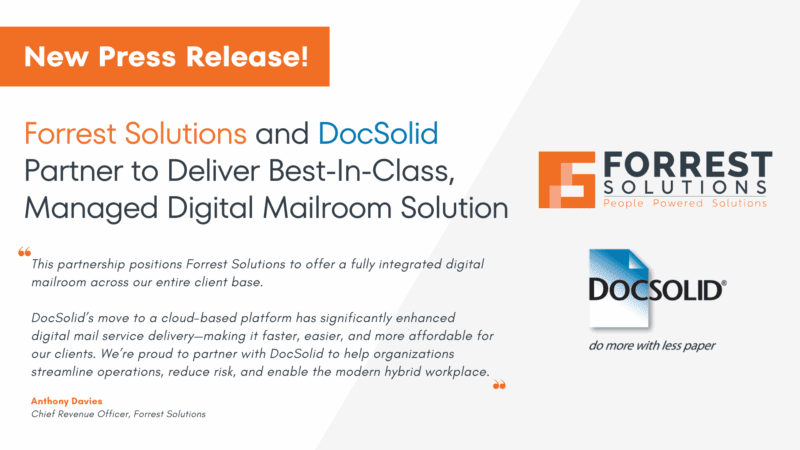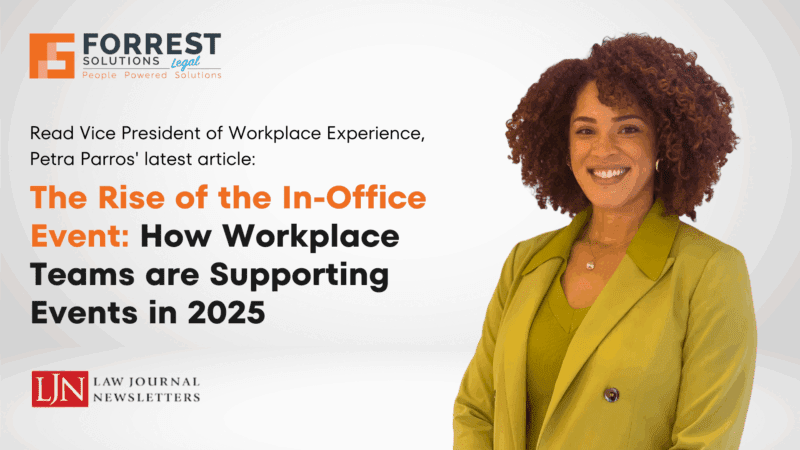
AI and Hospitality: Transforming Law Firm Workplaces for the Future
By Anthony Davies
This article originally appeared in Law.com here.
Workplace experience is taking its place as a strategic priority heading into 2024. According to CBRE’s most recent Bright Insights, law firms are placing workplace experience in their top 3 strategic real estate objectives for 2024–alongside preparing for the “future of work.” It is important to note that workplace experience and the future of work outrank business priorities commonly seen in previous years such as optimizing the real estate portfolio, diving cost savings, and supporting ESG goals.
There’s a reason why these strategic priorities have shifted firms: in a law firm, the workplace is more than just a physical space; it’s the nucleus of collaboration, innovation, and client service. As the world ushers in a new era post-pandemic of hybrid operations, it’s really no surprise that workplace experience is a top, strategic lever law firm leaders are driving in conjunction with re-envisioning the space their professionals are occupying, including:
- 77% of law firms have implemented or considering universal office sizes for all attorneys
- 63% of law firms have implemented or are considering desk sharing or hoteling for attorneys
- 42% of law firms have implemented or are considering smaller offices and or workstations
- 31% of law firms report their footprint to be moderately smaller in 2024
- 14% of law firms believe their footprint will be moderately larger[1]
This is unprecedented and reflects our fundamentally changing attitudes about the meaning of the office—which brings us to the impact of AI. 2023 was also the year AI–and specifically generative AI–overtook the headlines in the legal industry.
Released in November of 2022, few technologies have taken center stage as quickly and comprehensively as ChatGPT in the past 13 months. Delighted by its potential, use cases have been met with a vast array of results with many focusing on the negative outputs or risk of hallucinations that can be produced in the application of legal work.
However, outside of the delivery of legal services, the business side of most firms have AI in production. In terms of applying gen AI to law firm operations, Thomson Reuters reported that about 3% of firms are already using generative AI or ChatGPT for law firm operations, and an additional 2% said they are actively planning for its use[2]. About one third of respondents (34%) are still in the consideration phase for generative AI and ChatGPT, while 60% answered they have no current plans for generative AI use in firm operations.[3]
Here’s the thing: can AI be applied to firm’s top operational priorities such as workplace experience? In short, that answer is yes.
AI and the Evolution of the Law Firm Workplace
Traditionally, law firms have upheld the sanctity of office spaces, emphasizing privacy, confidentiality, and the prestige of physical addresses. However, the landscape has shifted. Hybrid work became the norm, reshaping perceptions about the necessity of physical offices. As firms now navigate their version of return to the office, the focus is on reinventing these spaces into dynamic, versatile hubs that cater to evolving needs.
Workplace experience is a key element to this success, bringing Ritz Carlton, 5-star hospitality to transform the office into a destination that is better than home. Workplace experience helps organizations attract and retain top talent and make a hybrid workplace efficient and productive—but are we talking about solely human-centric delivery of services?
AI isn’t merely about automating tasks; it’s the linchpin in redefining the workplace experience, enabling organizations to provide unprecedented, personalized experiences and customized interactions. Through predictive analytics, AI is capturing data and suggesting optimized real estate usage, maps patterns to identify peak utilization hours and space requirements. This data-driven approach ensures efficient allocation of resources, thereby reducing operational costs and enhancing profitability.
AI-powered virtual assistants are already streamlining administrative tasks, enabling lawyers to focus on high-value legal work. These assistants leverage AI to schedule meetings, manage calendars, and even perform basic legal research, empowering attorneys to delve deeper into complex cases while minimizing mundane responsibilities.
Across our professional services clients, AI is now increasingly leveraged in the delivery of workplace operations, and we have implemented and integrated a wide range of AI powered technology:
At a global accountancy firm:
- Motion detectors and heat sensors warn our support professionals if a room has been booked and not used, or vice versa so we optimize meeting room space.
- AI helps determine how many floors should be open each day, based on daily attendance data. That would be dynamic space utilization.
At a global financial services firm
- Catering and beverage preferences are stored for individuals so when they travel, and book hoteling desks favorite foods are made available without asking.
- Uber Eats deliveries are enabled with desk deliveries, through integration with the room/desk booking software.
At a global real estate firm:
- Desk booking technology integrates with heat and noise monitors, so desk booking can suggest the most appropriate space based on personal preferences.
- Facial recognition software like Jibble.io has replaced card swipes to help improve attendance data. According to a June survey of 2,000 people from Owl Labs, a company that makes videoconferencing devices, 58%, of hybrid workers admit to “coffee badging,” or the act of going into the office building for their morning coffee, earning an imaginary badge for it, and then going home to work for the remainder of the day.
The Intersection of AI and Hospitality
When surveyed, the vast majority of clients do not think their law firm partners are sufficiently innovative.[4] That’s because about 70% of corporate clients are being proactive about their implementations of AI.[5] While 60% of firms are in ‘wait and see mode’, all could benefit from the infusion of hospitality principles into the technological advancements facilitated by AI. Personalization and client-centricity lie at the heart of hospitality, and this ethos seamlessly merges with AI to create an inviting, client-focused environment within law firms.
- Elevating Client Experience. From the moment a client steps into the office, AI-enhanced hospitality creates a welcoming ambiance. Facial recognition technology coupled with client databases ensures personalized greetings, making visitors feel valued and recognized. AI-powered receptionists efficiently manage check-ins, swiftly connecting clients with their designated lawyers while providing real-time updates on meeting schedules.
- Customized Workspace Allocation. AI’s prowess in understanding behavioral patterns and preferences allows for tailored workspace allocations. Whether it’s a preference for a quiet corner or a collaborative space, AI tracks and adjusts office layouts accordingly, optimizing the environment for both individual focus and collaborative endeavors.
- Seamless Navigation and Assistance. Navigation within the office becomes a breeze with AI-enabled wayfinding systems. Integrated with mobile apps, these systems guide clients and employees through the office premises, offering assistance and information about meeting room availability or amenities.
- Wellness and Comfort. AI monitors environmental factors such as lighting, temperature, and air quality in real-time. This ensures optimal comfort levels for both clients and employees, fostering a conducive atmosphere for productivity and well-being.
Paving the Way for a Return to the Office
As law firms embrace a hybrid work model, the office becomes a strategic hub for collaboration, mentorship, and team synergy. AI’s role in this transition is paramount and shouldn’t be feared for its impact on client service or hospitality but rather embraced as the next step in a continuous and accelerated innovation roadmap. Through AI-powered analytics, firms gauge employee preferences for remote or in-office work, facilitating a flexible yet structured approach to workspace utilization.
AI-driven data also aids in designing staggered schedules and flexible seating arrangements, ensuring a safe and socially distanced return to the office. Furthermore, contactless technologies integrated into the workplace—such as touchless entry systems and voice-activated controls—mitigate health concerns and instill confidence among employees returning to a shared space.
The Future Landscape
The amalgamation of AI and hospitality within law firm workplaces marks a paradigm shift in how legal professionals operate. It’s not merely about embracing technology; it’s about creating an ecosystem that harmonizes human experience with technological innovation.
As law firms venture into this hybrid realm, the focus remains on fostering a workplace culture that nurtures collaboration, innovation, and client-centricity. AI, bolstered by hospitality principles, serves as the catalyst propelling this evolution—an evolution that transcends the boundaries of traditional office spaces, redefining the future of legal work.
In conclusion, the synergy between AI and hospitality isn’t just a concept—it’s a blueprint for the future of law firm workplaces, where technology augments human potential and elevates the overall experience, ensuring that the return to the office is not just a transition, but a transformation.
[1] Cushman & Wakefield2023 Bright Insights
[2] Thomson Reuters Institute: ChatGPT and Generative AI Within Law Firms
[3] Ibid
[4] Thomson Reuters Thriving in the Age of Generative AI
[5] Ibid





